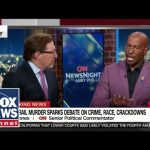In a shocking act of political violence, conservative activist Charlie Kirk was targeted during his American Comeback Tour stop at Utah Valley University. Kirk, the founder of Turning Point USA, had drawn an audience of over 2,000 people eager to hear his message about restoring America’s values, when the unthinkable happened. In the middle of a spirited Q&A session, a gunshot rang out, sending the crowd into a panic. Eyewitnesses described scenes of fear and confusion as attendees dropped to the ground, unsure whether more shots would follow.
Moments before the shooting, Kirk had been addressing a volatile question on transgender issues, further highlighting the politically charged atmosphere surrounding conservative voices on college campuses. Witnesses say Kirk collapsed immediately after the shot, though early reports indicate there were no visible signs of serious injury at the scene. Former Congressman Jason Chaffetz, who was present with his family, called the incident a harrowing reminder of the dangers public figures face simply for exercising free speech and challenging progressive orthodoxy.
Following the incident, Kirk was rushed out by his security team as law enforcement locked down the venue. Within hours, the FBI announced it was launching an investigation, emphasizing the seriousness of the attack. Across the political spectrum, leaders condemned the act, with even figures like California Governor Gavin Newsom issuing statements denouncing violence against political figures. Yet for many in the conservative movement, the attack represents not just a security failure but a wider cultural problem—the increasing hostility toward right-of-center voices in America.
Indeed, the shooting cannot be divorced from the broader climate of demonization conservatives have faced in recent years. Whether it’s students shouting down speakers, universities imposing last-minute restrictions, or high-profile figures facing threats for voicing dissent, conservative Americans are routinely told their views are unwelcome in public discourse. The targeting of Kirk at a university event underscores the growing danger: when free speech is vilified long enough, someone inevitably tries to silence it through force.
As Kirk’s supporters pray for his recovery and await updates on his condition, this incident should serve as a turning point. America must rediscover its commitment to open dialogue and the protection of free expression, regardless of political affiliation. Conservatives know freedom comes at a cost, but violence against speakers is a line no civilized nation can tolerate. If America is to remain a free republic, then safety for voices like Charlie Kirk’s is not negotiable—it is essential.




